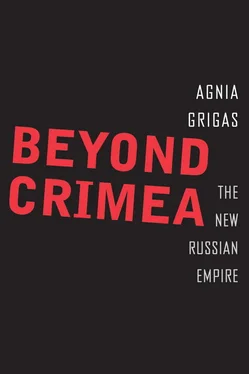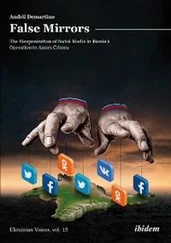The targets of Russian information propaganda are legion: the Russian diaspora, the broader audience of the countries within Russia’s sphere of influence, Russian domestic audiences, and the international community. While Russian media sometimes target these different audiences at different stages and in different ways, at times they do so simultaneously. Most generally, the initial target audience tends to be the compatriots residing in any particular former Soviet republic, who are presented with a Moscow-biased version of current events and history. Then, the idea is introduced that the compatriots are at risk from hostile forces in Europe, America, the titular nationality—the dominant eponymous ethnic group in the country—and/or the country’s nationalist and “fascist” groups. The surprisingly high degree to which Russian information warfare and propaganda are accepted both domestically and in the former Soviet republics is closely related to the fact that Russian state-controlled media tend to dominate the information space of the entire post-Soviet region. Local media do not have sufficient resources or are simply not sufficiently established to compete with Russian state-funded media. Likewise, due to the prevalence of the Russian language, the vast majority of the audience consistently opts for Russian over English or other foreign-language media. In November 2014, the Russian state-owned news agency Rossiya Segodnya announced the launch of a new international media project, Sputnik, that will broadcast in forty-five languages and have offices in all post-Soviet states with the exception of Turkmenistan. 83The Russian government also intended to beef up the spending in 2015 for the Russia Today international TV network and for Rossiya Segodnya, which also incorporates the Voice of Russia radio station and the international news agency RIA Novosti, by 40 percent and 200 percent respectively. 84However, given the enormous fluctuations of the ruble in the foreign exchange market, which in early 2015 lost nearly 50 percent of its value vis-à-vis the dollar, the combined funding for Russia Today and Rossiya Segodnya actually decreased from $695 million in 2014 to $335 million in 2015. 85
Information warfare campaigns in the near abroad tend to create divisions in target societies as well as shore up support for Russia’s military campaigns among the domestic audience. The campaigns are either simultaneously or subsequently extended to international audiences in order to present events with a Kremlin bias and justify Russia’s policy choices. As case study chapters will show, Moscow’s information warfare was exemplified in the Georgian and Ukrainian wars where it was used strategically to advance Russian military aims. In the case of Kyrgyzstan, Moscow’s targeted propaganda campaign arguably played a contributing role in toppling a regime.
The Russian propaganda machine is an elaborate industry that dates back to the Second World War with the purpose of deception and manipulation of information. Russian information warfare theory is derived directly from spetspropaganda (special propaganda) theory, which was first taught as a separate subject in 1942 at the Russian Military Institute of Foreign Languages. Although the subject was removed from the curriculum after the collapse of the USSR, it was reintroduced after Putin launched the Information Security Doctrine in September 2000. The doctrine was generally interpreted as the state’s attempt to take control over mass media and subordinate its functioning to the needs of government and national security. 86Among its outlined measures for maintenance of information security in domestic politics was the “launching of counterpropaganda activities aimed at prevention of negative outcomes from the dissemination of disinformation about Russian internal politics.” 87At that point the Russian Military Institute was rebranded as the Department of Foreign Military Information of the Military University of the Ministry of Defense of the Russian Federation. 88According to deputy director of the Warsaw Centre for Eastern Studies, Jolanta Darczewska, in the Department of Foreign Military Information the Russian military trains specialists in “organizing foreign information and military communication,” “information analysis,” and “monitoring and development of military information.” 89However, information warfare is not limited to this single institution: as of 2014 there were at least 74 research and scientific institutions, forming the Scientific and Methodological Association of Higher Education Facilities of the Russian Federation Covering Information Security, established upon the initiative of the FSB (the former KGB). 90
The modern Russian information warfare tradition distinguishes itself from its peers in other countries by the extensive use of such concepts as strategicheskaya maskirovka (strategic masking) and reflexive control. The highest cadres of Kremlin’s leadership have studied this science, including Deputy Prime Minister Dmitry Rogozin, who has been in charge of the Russian defense industry since 2011. Rogozin comes from a family of Soviet military scientists, and was among the first seven persons sanctioned by the U.S. government following Crimea’s annexation in March 2014. In his writing he has analyzed the strategic masking concept, which involves the use of deception and manipulation of the enemy. 91According to Rogozin, strategic masking is devised by the highest politico-military levels and employs various military units to jam radios, spread disinformation via media, and manipulate the enemy into believing false reports of military movements. 92This has been demonstrated in the Ukrainian and Georgian wars where non-Russian media were immediately blocked in occupied territories and the strategic government and military communications of these countries were breached and impaired. Reflexive control is defined by Rogozin as a means of supplying an opponent with specially prepared information or disinformation to incline him to voluntarily make the predetermined decision desired by the initiator of the action. 93All this is accomplished while exploiting the moral, psychological, and other factors affecting the target. 94In practice, these tactics can include lowering the morale of the opponent’s military or society and thus making them less likely to resist foreign military aggression.
Along with specialized institutions that focus on training information warfare specialists, Russia also operates institutions that are dedicated to manufacturing and spreading propaganda to mass audiences. In St. Petersburg, Russian businessmen run a bona fide internet comment factory, Internet Research LLC, employing about 250 people working twelve-hour shifts round the clock writing pro-Kremlin blogs. The connection of the comment factory with the Kremlin has not been proven, but then, such links are difficult to establish in many forms of information and cyber warfare. 95The employees of Internet Research mostly work in the Russian blogging platform LiveJournal and a Facebookesque social network, Vkontakte. 96Some write the posts, others comment on them. The content always focuses on praising Putin and his policies while condemning the West 97—for instance, with allegations of Ukraine being run by a pro-American Kiev junta or by pro-American Nazis. 98
In addition to a blogging factory, there is a perception that the Russian government operates an army of hackers who conduct cyber warfare campaigns supporting its foreign policy and military aims. Cyber warfare relies on computers and other electronic devices for hacking and damaging an enemy’s information systems and its strategic or tactical resources for purposes of espionage or sabotage. Indeed, many cyber security experts agree that since the 2000s Russia has acquired the greatest capability in the world for cyber warfare and uses it primarily for foreign policy aims, in contrast to the runner-up, China, which concentrates on economically motivated cyber espionage. Although the Kremlin denies it, Russia was the first in history to coordinate a cyber attack with a military campaign when its hackers reportedly worked alongside Russian military forces in their invasion of Georgia in 2008, targeting Georgian internet infrastructure. 99Earlier in Estonia, in 2007, pro-Russia hackers carried out a highly similar DDoS (distributed denial of service) campaign against Estonian business and government during a diplomatic spat between Tallinn and Moscow. 100Likewise, since 2014 pro-Russian hackers have been leading a cyber espionage campaign against the Ukrainian government and even against NATO. 101
Читать дальше












